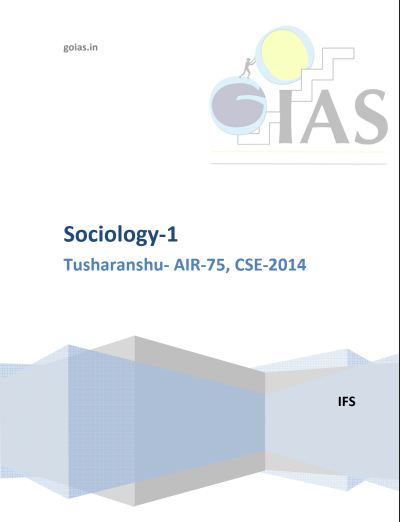‘Tusharanshu Sociology Notes’ PDF Quick download link is given at the bottom of this article. You can see the PDF demo, size of the PDF, page numbers, and direct download Free PDF of ‘Sociology preparation strategy’ using the download button.
Sociology Optional Notes By Tusharanshu PDF Free Download

TOPIC-01- PERSPECTIVES ON THE STUDY OF INDIAN SOCIETY
Questions asked in previous years
• Indology (GS. Ghurye).
• Structural functionalism (M N Srinivas).
• Marxist sociology ( A R Desai).
• Indology (GS. Ghurye).
• Short note on the Indological perspective of GS Ghurye
• Examine utility and limitations of indological source material to understand Indian society
Cultural approach- 3 types:
• Indological
• Little and Great tradition (Milton Singer and McKim Marriot)
• Pure and Impure theory- Louis Dumont
Sociological methods to study Indian society- 2 schools
•Sociology for India: Can’t compartmentalize sociology. A discipline is not country-specific. Indians go abroad to study Sociological theories and then apply them on India. (Dubey, Andre Beteille, AR Desai)
• Sociology of India: Culture is a guide to human behavior and Indian sociology is different. It has many of its own contexts like paap-punya. kanyadaan, pitradaan etc. Indian culture is unique and so should Indian sociology.
Eg: Indologists, cult urologists (Ghurye, Dumont, Oommen Citicism: SC Dubey- Hindu culture is not Indian culture. Plus, it is constantly changing and no fixed entity like Indian culture. It tell what society ought to be & not what it
actually is. Andre Beteille: Follower of Weber; Vast unorganized dichotomous and chaotic.
Indological or cult urological approach
• Indology- literally means- the systematic study of Indian society.
• The Indological approach rested on the assumption that historically, Indian society & culture are unique and that this ‘contextually’ specificity of Indian social realities could be grasped better through ‘texts’
• It may also be viewed that the Indological approach refers to the historical and comparative method based on Indian texts in the study of Indian society.
Therefore, Indologists use ancient history, epics, religious manuscripts, and texts, etc. in the study of Indian social institutions.
• It is seen as a distinct perspective because its followers believe that India cannot be studied through European concepts.
The look at scriptural texts to study India
• As social institutions of Indian society are rooted in literary and learned traditions, many sociological studies have made use of textual sources for explaining the ideological and jural bases of our institutions.
• Indologists make sense of India through the lens of Indian culture.
• The implicit assumption here is that there has been cultural continuity in Indian society as the texts are centuries old. Two main Indologists- GS Ghurye and Louis Dumont.
• Indological approach is grounded in 18-19th century orientalist approach, which was initiated by Europeans to know India better.
The development of sociology in india owes deeply to the contributions made by orientalists like Sir William jones, Henry Maine, max Mueller and others.
These scholars studied the rich ancient cultural and philosophical tradition of India.
• The study of Sanskrit provided a powerful stimulus not only to Indology but to other disciplines as well, such as- philology, comparative mythology and comparative jurisprudence
• The Indological writings dealing with the Indian philosophy, art and culture are reflected in the works of most of the Indian scholars. Ananda Coomarswamy.
B.K. Sarkar, RadhakamalMukerjee, G.S.Ghurye, D.P. Mukerji are some of the examples who have revealed this in their works
• It gives book-view, They imagine India through the texts left behind. These texts range from literature, art, architecture, dances, rituals, symbols etc. Book view can be religious (Mahabharata, Ramayana, manusmriti, vedas, Upanishads etc) or non-religious (Indica, Arthashastra, Ain-i-Akbari etc).
Can be unauthenticated like most of the texts left behind or authentic like govt. census.
• Celebrate Indian culture. Integrative approach.
• History, Sanskrit and Philosophy are strongly grounded in indological approach Limitations of indological approach:
• Fundamentally based on assumption that Indian society unchanged for 3000 years.
• Equate Indian culture to Hindu culture, and hindu culture to brahmanical culture.
Brahmins are just 15% of Hindus. Divisive ideas.
Brahmanical culture did influence India but that was only one of the many factors.
• Treat entire Indian society as monolithic and has over simplified. demands that his sociology should take into account new &radical aspirations was one of most moving aspects of his writing.
By use of terms such as Sanskritisation, “dominant caste”, “vertical (inter-caste) &horizontal (intra-caste) solidarities”, Srinivas sought to capture fluid &dynamic essence of caste as a social institution.
Sanskritzation:
Endogenous changes in tradition of Hinduism – confined to Sanskritization before Western contact.
Sanskritization took place in two different forms
• first, as historical process by collective recognition of lower castes to the ranks of uppercastes as a result of their acts of chivalry, rise in economic and power status and politicalalliances.
In most such cases mobility was legitimized by consensus of the dominant castes and came into being as a historical necessity.
Such legitimating to status upgrading was provided by the estab-lished higher castes, even by kings through royal decrees, and by other formal means of admittance to a higher rank recognized by the priestly castes.
Here, anskritization had a wider historical implication Although its impact was confined to a region or a sub-region the implicit political and economic relationship in its background gave it a new dimension of importance.
| Author | Tusharanshu |
| Language | English |
| No. of Pages | 277 |
| PDF Size | 5 MB |
| Category | Education |
| Source/Credits | drive.google.com |
Related PDFs
Sociology Haralambos And Holborn Blue Book PDF
